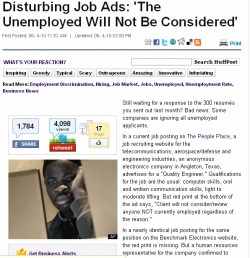A report in  The Huffington Post two days ago has sent the recruiting world into a paroxysm of self-examination.
The Huffington Post two days ago has sent the recruiting world into a paroxysm of self-examination.
Dozens of comments here at ERE and more at RecruitingBlogs and probably elsewhere too, are condemning the practice of excluding the unemployed from jobs.
The HuffPo article reported that some companies are specifically discouraging the unemployed from applying. It cites a few specific example, and says it’s not hard to find ads with wording such as this from Craigslist for a restaurant manager: “Must be currently employed.”
The article doesn’t say whether this is a trend. However, one of the ERE posters commented that “This ‘practice’ been going on for almost as long as I can remember (30+ years of TPR) now everyone is upset because a company actually said it in a job post?”
ERE blogger Brenda Le triggered the discussion when she wrote about the HuffPo article and said: “IMHO — It is a disgrace in this country, given the current economy that companies are practicing this kind of behavior — it can’t possibly be the norm.”
The 31 comments (at the time I posted this article) mostly agree with her. A few suggest the practice may have some validity as a screening tool, but that it’s unwise from a PR standpoint.
Over at RecruitingBlogs the discussion is decidedly more shrill. Some of the comments to a blog post there draw comparisons to Hitler’s generals. Like ERE’s Le, IT recruiter and blogger Nikole Tutton took to task employers who don’t want the unemployed.
“Hey Recruiters! What gives?,” she scolded. “What ever happened to ‘Let’s help America by putting her back to work one job at a time.’? Isn’t this prolonging the job crisis and unemployment by further dividing the ‘haves’ and ‘have nots’?”
Like the ERE discussion, most participants are taking great umbrage over the exclusion of the unemployed. One brave recruiter, however, commented, “I never signed up to ‘put America back to work’… My job is to recruit the profile of individual my client desires. If this profile is not discriminatory in nature I have no moral struggle with doing so.”
Discriminating against the unemployed, observes The HuffPo article, is not prohibited, though it could, potentially, have a disparate impact on minorities, especially black men who have an unemployment rate nationally in May of 17.1 percent.
In certain states and metro areas, that percentage is significantly higher. In Michigan, the unemployment rate for black men for 2009 was 26 percent.
While the HuffPo article limited itself to a handful of sites, I checked some of the biggest job boards for phrases such as “currently employed,” “must be currently employed,” and one cited in the article: “no unemployed will be considered.”
A few of these turn up on both CareerBuilder and Monster. Many are for restaurant management jobs. This one, which says, “Must be currently employed or no more than 3 months out of the restaurant business,” is typical. This one on CareerBuilder for a B2B software and services sales person, says “Must be Currently employed!”
Most of the ads I found appear placed by one or another agency, which may well be taking marching orders from the client. Thus, the general taking orders from Hitler reference at RecruitingBlogs.
Some of the more thoughtful posters make an interesting point about how recruiters covet, above all others, the passive candidate. That would imply an exclusion of the unemployed, who, if they are seeking work, are “active” candidates. Then again, recruiters posting on a job board, are implicitly soliciting active candidates who, for one reason or another, want out of the job they currently have.
To me, that’s a bit of dark irony, since the end result of that process is to welcome (even if unintentionally) those who can’t stand their job, their boss or may be one step ahead of being fired, while rejecting a group of people that includes top performers, team players, and other, similarly qualified persons.
Notwithstanding that logical oddity, there may be good reasons for excluding the unemployed. In the case of someone out of the job market for some time, their skills may have grown stale or, for a rainmaker type job, losing touch with key contacts may be an issue. I’m reaching here, I know, since there are more diplomatic and productive ways of addressing those concerns.
Whatever positive benefit there might be in limiting the applicant pool by excluding the unemployed, the downside seems much worse. At the very least, an employer may miss out on some highly qualified candidates. There’s also a hit to the employer brand. It may be small, but most brand damage is incremental, not monumental.
Where do you come down on this issue? What do you think of employers who exclude the unemployment? What are the pros and cons? Comment here or participate in the discussion at “Unemployed Will Not Be Considered” (Right or Wrong?).